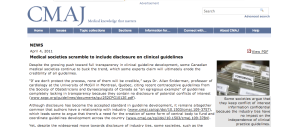February 25, 2010
By Kate Johnson
In the loud noise that echoed worldwide after the Lancet’s stunning retraction of Andrew Wakefield’s controversial paper on the autism/MMR vaccine link, there was an equally stunning whisper from the journal’s editor Dr. Richard Horton, that is still bouncing around disagreeably in my head.
In a nutshell, it was a cloaked threat to the public’s right to know.
“The lesson we’ve learned is that anything we publish will be picked up and used. It certainly made us much more risk-averse, much more conservative,” he told National Public Radio.
“We now try to be even more cautious about the kinds of work we publish, recognizing that you cannot have a closed discussion in the scientific community about anything today. Everything is accessible to everybody, at any time.”
Yes, he acknowledged the journal’s mistake in publishing the fraudulent paper. In fact, he called it a “system failure”. “We failed, I think the media failed, I think government failed, I think the scientific community failed,” he said.
But then he dropped the “too much information” bomb.Read More »

